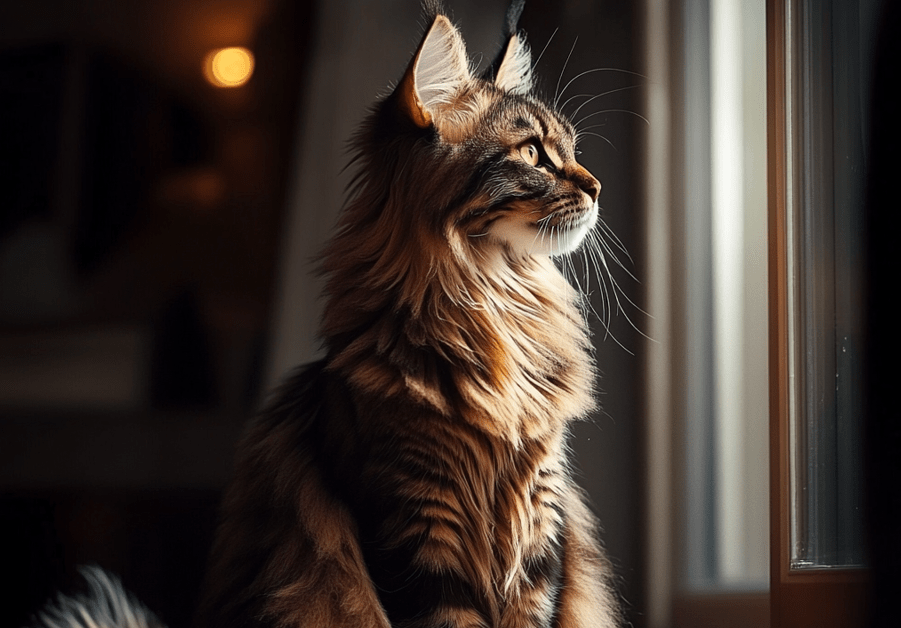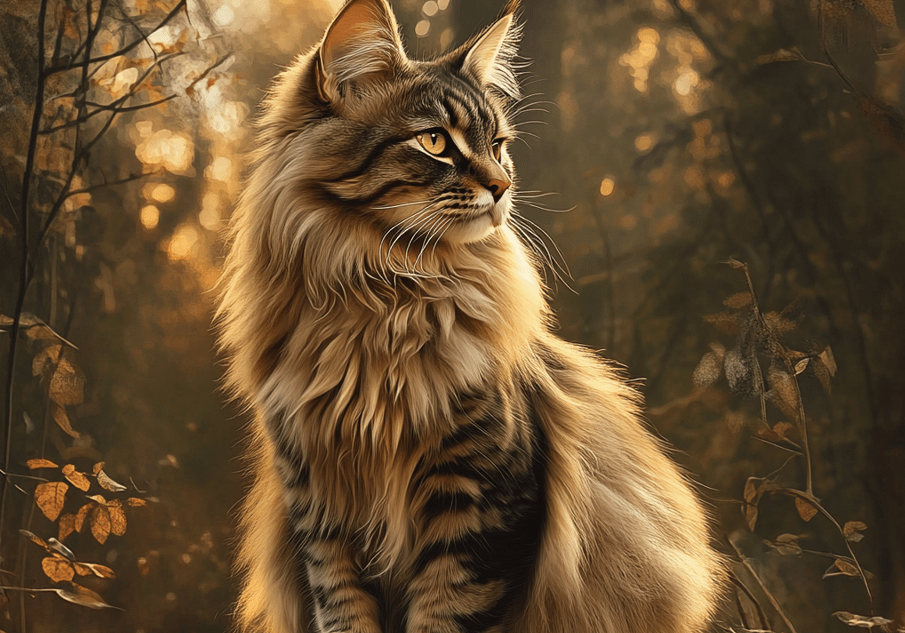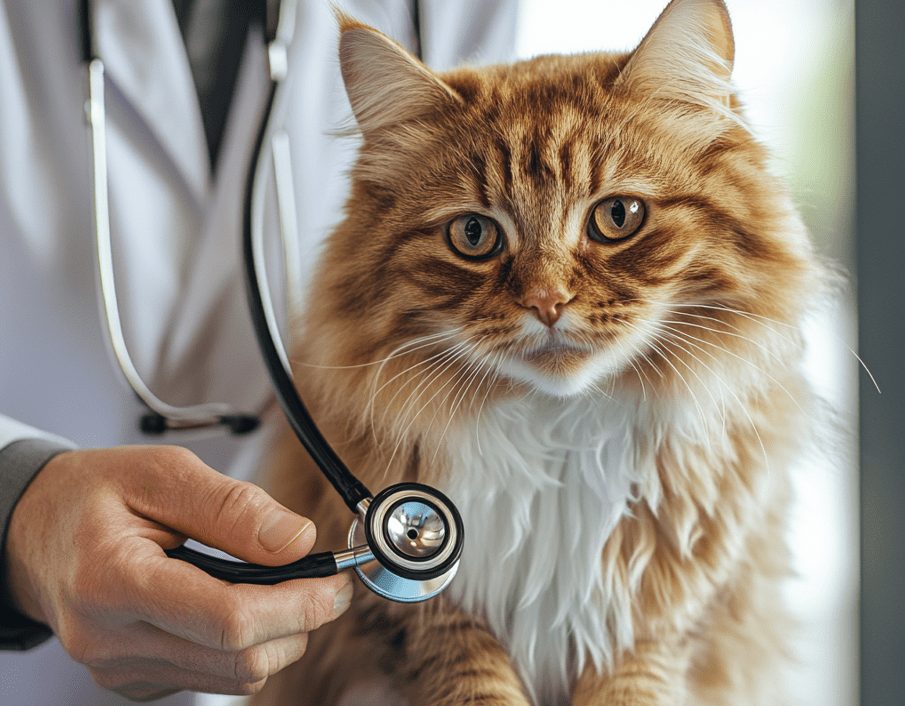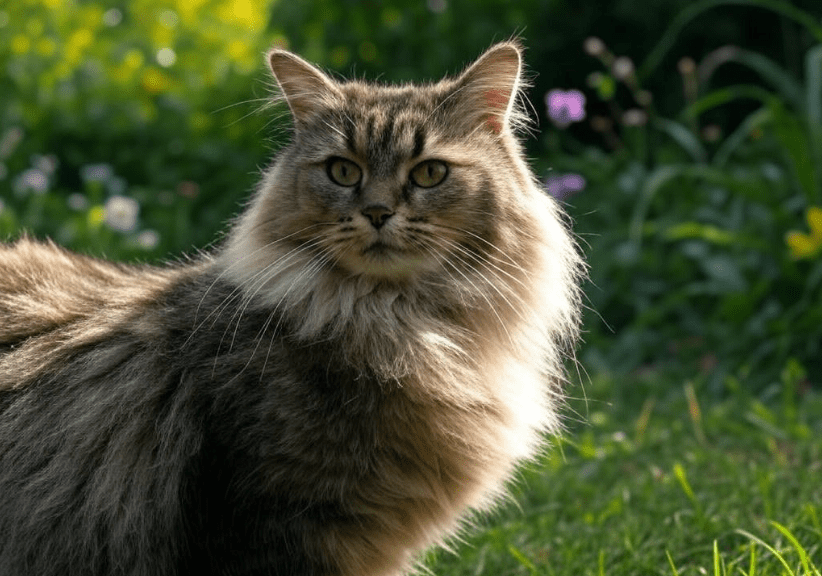
Maine Coons, with their majestic size and playful personalities, are a delight to have as companions, but meeting their Maine Coon exercise needs is crucial to keeping them healthy and happy. Known as “gentle giants,” these large cats require regular physical activity to maintain their weight, support joint health, and satisfy their curious, intelligent minds. In this comprehensive guide, we’ll explore why exercise is essential for Maine Coons, how much they need, and fun, engaging ways to keep them fit, ensuring they thrive as active, vibrant pets.
Why Exercise Matters for Maine Coons
Maine Coons are one of the largest domestic cat breeds, with males weighing 13–18 pounds and females 8–12 pounds. Their size, combined with their energetic and social nature, makes exercise a vital part of their care. Meeting Maine Coon exercise needs prevents obesity, reduces the risk of breed-specific health issues, and keeps their minds sharp.
Health Benefits of Exercise
Regular physical activity offers numerous benefits for Maine Coons:
Weight Management: Maine Coons are prone to obesity, which can lead to diabetes, joint problems, and heart disease. Exercise burns calories and maintains a healthy body condition.
Joint Health: Their large frames put stress on joints, and conditions like hip dysplasia or arthritis are concerns. Exercise strengthens muscles, supporting joints and improving mobility.
Heart Health: Maine Coons are at risk for hypertrophic cardiomyopathy (HCM). Activity promotes cardiovascular health, reducing strain on the heart.
Mental Stimulation: These intelligent cats need mental engagement to prevent boredom, which can lead to destructive behaviors or overeating.
Emotional Well-Being: Play strengthens the bond between you and your Maine Coon, reducing stress and boosting their confidence.
Risks of Inadequate Exercise
Without enough activity, Maine Coons may face:
1.Weight gain and obesity-related complications.
2.Muscle loss, leading to reduced mobility.
3.Behavioral issues like scratching furniture or excessive meowing.
4.Stress or depression from lack of stimulation.
Understanding Maine Coon Exercise Needs
To meet Maine Coon exercise needs, consider their unique traits and how factors like age, health, and environment influence their activity requirements.
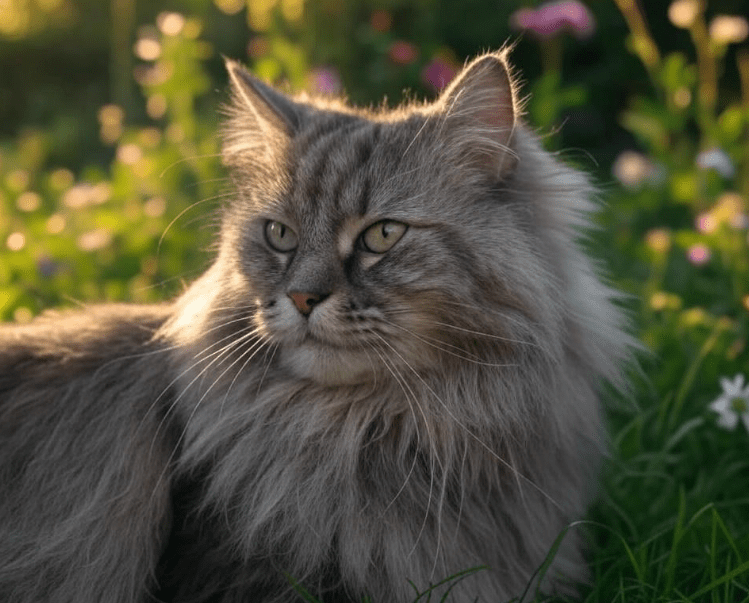
How Much Exercise Do Maine Coons Need?
On average, Maine Coons need 20–40 minutes of active play daily, split into 2–3 sessions. This varies by:
Kittens (0–1 year): High-energy and curious, kittens may need 30–60 minutes of play to support growth and development.
Adults (1–7 years): Healthy adults thrive with 20–30 minutes of moderate to vigorous activity.
Seniors (8+ years): Older Maine Coons may need gentler, shorter sessions (10–20 minutes) to accommodate reduced stamina or joint issues.
Factors Influencing Exercise Needs
Size and Weight: Larger Maine Coons may tire faster but still need activity to prevent weight gain.
Health Conditions: Cats with obesity, arthritis, or HCM require tailored exercise plans, often guided by a vet.
Personality: Some Maine Coons are more playful, while others are laid-back, affecting their enthusiasm for exercise.
Environment: Indoor cats need more structured play than those with outdoor access, as they lack natural hunting opportunities.
Signs Your Maine Coon Needs More Exercise
Watch for these indicators that your Maine Coon isn’t getting enough activity:
1.Weight gain or a round abdomen (check their body condition score).
2.Lethargy or reluctance to engage in play.
3.Destructive behaviors like scratching or chewing.
4.Excessive vocalization or attention-seeking.
5.Restlessness, especially at night.
Fun Ways to Meet Maine Coon Exercise Needs
Maine Coons are playful, intelligent, and responsive, making it easy to incorporate fun activities into their routine. Here are creative, engaging ways to keep your Maine Coon fit while satisfying their physical and mental needs.
1. Interactive Play with Toys
Maine Coons love interactive toys that mimic hunting. Try these:
Feather Wands: Wave a feather wand to encourage chasing, jumping, and pouncing. Rotate different wands to keep it exciting.
Laser Pointers: Guide the laser across the floor or up walls to spark their prey drive. Always end with a physical toy to “catch” for satisfaction.
Balls and Mice: Lightweight balls or stuffed mice encourage batting and chasing. Maine Coons often enjoy fetching, so toss toys for them to retrieve.
Crinkle Toys: Toys with crinkle sounds or catnip stimulate their senses, prompting play.
Tip: Spend 10–15 minutes per session, varying toys to prevent boredom. Store toys out of reach between sessions to maintain novelty.
2. Puzzle Feeders and Treat-Dispensing Toys
Combine mental stimulation with exercise using food-based activities:
Puzzle Feeders: Place kibble in puzzle feeders to make your Maine Coon work for their meal, encouraging movement and problem-solving.
Treat Balls: Fill a ball with low-calorie treats that dispense as your cat rolls it, promoting physical activity.
DIY Options: Hide kibble in cardboard tubes or under cups for a scavenger hunt.
Tip: Use these for 10% of their daily food to avoid overfeeding, especially since Maine Coons are prone to overeating.
3. Cat Trees and Climbing Structures
Maine Coons love to climb and perch, thanks to their large size and agile bodies. Provide:
Multi-Level Cat Trees: Choose sturdy trees with wide platforms to support their weight. Place near windows for bird-watching.
Wall Shelves: Install cat-safe shelves for climbing and jumping.
Scratching Posts: Tall, robust posts satisfy their scratching instinct and encourage stretching.
Tip: Rotate toys or treats on perches to encourage exploration. Ensure structures are stable to prevent tipping.
4. Agility and Training Games
Maine Coons are highly trainable due to their intelligence and dog-like personalities. Try:
Obstacle Courses: Set up tunnels, boxes, or hoops for your cat to navigate. Use treats or toys to guide them.
Clicker Training: Teach tricks like “sit,” “jump,” or “fetch” using a clicker and rewards. Short sessions (5–10 minutes) keep them engaged.
Leash Walking: Train your Maine Coon to walk on a harness for outdoor exercise. Start indoors and gradually move to safe, enclosed spaces.
Tip: Keep sessions positive and reward-based. Maine Coons respond well to praise and treats.
5. Play with Other Pets or People
Maine Coons are social and enjoy interaction. Encourage:
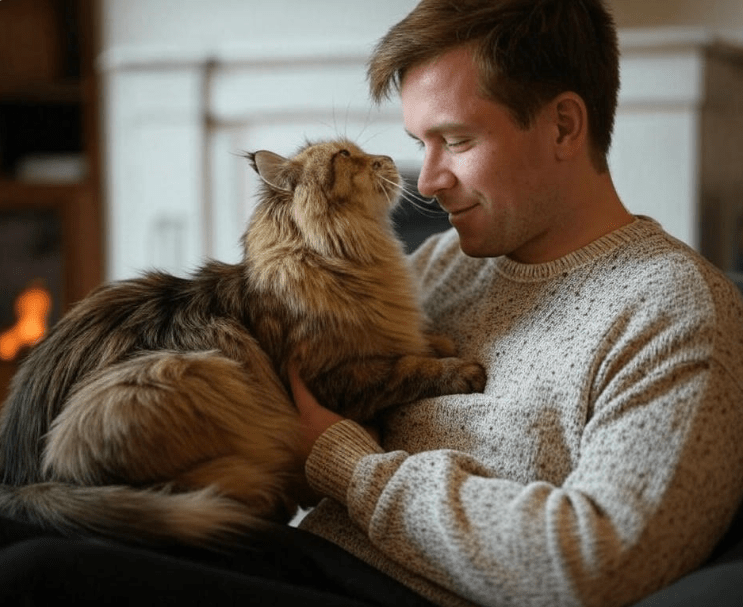
Play with Other Cats: If you have multiple cats, they may chase or wrestle, providing natural exercise. Monitor to ensure play stays friendly.
Family Involvement: Involve household members in play sessions to strengthen bonds and vary activities.
Supervised Dog Play: Maine Coons often get along with dogs, and gentle play can burn energy.
Tip: Supervise interactions to prevent overstimulation or aggression, especially with kittens or seniors.
6. DIY and Household Activities
Use everyday items for budget-friendly exercise:
Cardboard Boxes: Stack boxes or cut holes for a “fort” your Maine Coon can explore.
Paper Bags: Place a crinkle bag on the floor for pouncing and hiding.
String Games: Drag a string or ribbon for chasing, mimicking prey movement.
Tip: Ensure items are safe (no small parts or sharp edges) and rotate them to maintain interest.
7. Outdoor Enclosures or Catio
If safe and feasible, provide outdoor access:
Catio: Build or buy a secure outdoor enclosure where your Maine Coon can climb, explore, and watch nature.
Supervised Outdoor Time: Use a harness or enclosed yard for short outdoor sessions.
Tip: Check for escape routes and ensure the area is free of toxic plants or predators.
Tailoring Exercise to Your Maine Coon’s Life Stage
Maine Coon exercise needs vary by age and health. Adjust activities accordingly:
Kittens: Focus on short, frequent play sessions with soft toys to avoid overexertion. Encourage climbing to build strength.
Adults: Provide vigorous activities like chasing and jumping to burn energy and maintain weight.
Seniors: Use gentle exercises like slow wand play or low perches to accommodate joint stiffness or reduced stamina. Consult a vet for arthritis or HCM concerns.
Overweight Cats: Start with low-impact activities (e.g., treat balls) and gradually increase intensity as weight decreases. Pair with a vet-approved diet.
Cats with Health Issues: For cats with HCM or arthritis, avoid high-intensity jumping. Opt for stretching or slow chasing, guided by a vet.
Creating an Exercise-Friendly Environment
Set up your home to encourage activity:
Open Spaces: Clear areas for chasing and running, especially for indoor cats.
Varied Surfaces: Provide rugs, cat trees, and perches for different textures and heights.
Safe Hiding Spots: Boxes or tunnels offer rest areas between play.
Window Views: Place perches near windows for visual stimulation, reducing boredom.
Rotate toys and rearrange furniture periodically to keep the environment fresh and engaging.
Monitoring Your Maine Coon’s Exercise and Health
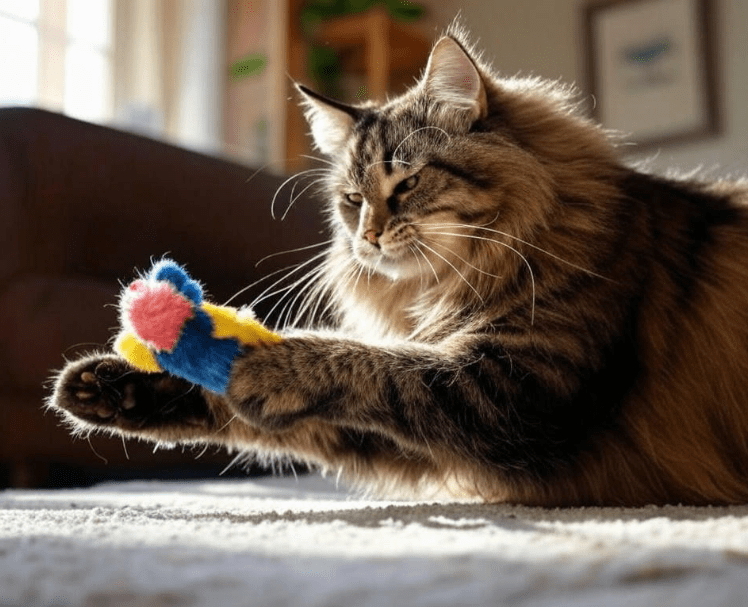
To ensure your Maine Coon’s exercise routine is effective:
Track Weight: Weigh monthly and check their body condition score (4–5 on a 9-point scale is ideal). Adjust exercise or diet if needed.
Observe Behavior: A fit Maine Coon is alert, playful, and content. Lethargy or aggression may signal health or boredom issues.
Annual Vet Visits: Screen for HCM, obesity, or joint problems. Discuss exercise plans, especially for seniors or overweight cats.
Watch for Overexertion: Panting, reluctance to continue, or hiding after play may indicate too much activity. Reduce intensity and consult a vet.
Common Mistakes to Avoid
Inconsistent Play: Sporadic sessions lead to boredom or weight gain. Stick to a daily routine.
Overfeeding Treats: Using too many treats during play can contribute to obesity. Use low-calorie options sparingly.
Ignoring Health Issues: If your Maine Coon avoids exercise or seems tired, don’t assume it’s laziness—check for medical causes.
Boring Toys: Maine Coons lose interest in repetitive toys. Rotate and introduce new ones regularly.
When to Consult a Veterinarian
Contact a vet if your Maine Coon shows:
1.Sudden disinterest in play or lethargy.
2.Weight gain despite exercise.
3.Limping, stiffness, or difficulty jumping (possible arthritis or hip dysplasia).
4.Rapid breathing or fatigue during activity (possible HCM).
5.Increased thirst or urination (possible diabetes or kidney issues).
A vet can recommend diagnostic tests (e.g., bloodwork, X-rays) and tailor an exercise plan to your cat’s needs.
Fun Facts About Maine Coon Exercise
Dog-Like Play: Maine Coons often enjoy fetching or following owners, making them ideal for interactive games.
Water Enthusiasts: Many Maine Coons love splashing in water, so try floating toys in a shallow tub for exercise.
Vocal Athletes: Their chirps and trills during play add a fun soundtrack to exercise sessions.
Conclusion
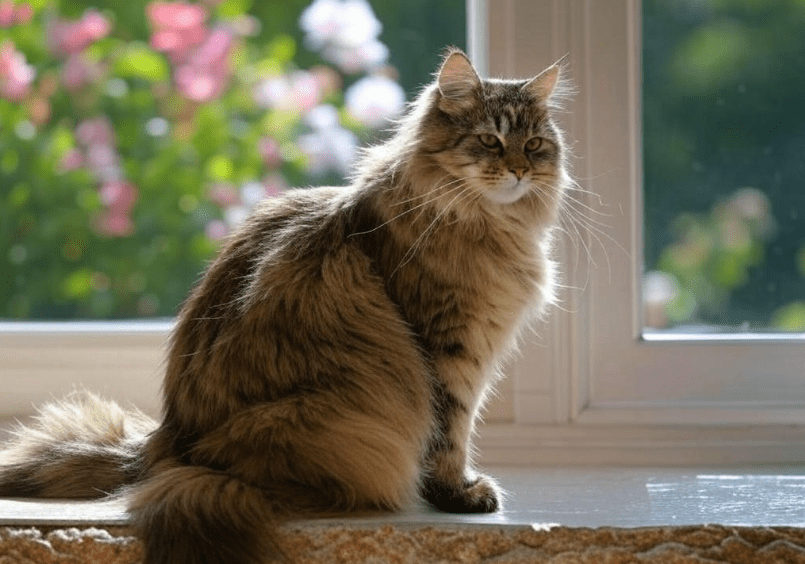
Meeting Maine Coon exercise needs is key to ensuring your gentle giant stays healthy, happy, and full of energy. By incorporating interactive toys, climbing structures, puzzle feeders, and training games, you can provide the physical and mental stimulation these intelligent cats crave. Tailor activities to their age, health, and personality, and create an environment that encourages movement. Regular exercise prevents obesity, supports joint and heart health, and strengthens your bond with your Maine Coon.
Start with short, fun sessions and build a consistent routine. If you notice changes in your cat’s activity or weight, consult a veterinarian for guidance. With the right approach, your Maine Coon will thrive as an active, playful companion for years to come.

